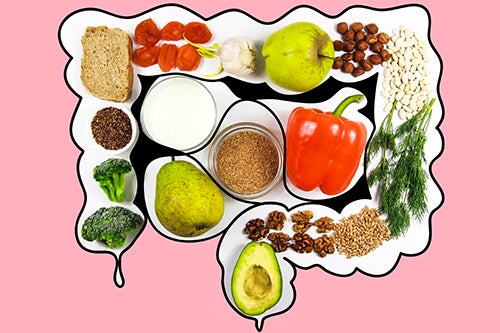Dietitian Rebecca Simpson Answers Your Questions about Colorectal (Colon) Cancer Prevention
March 6, 2024
By: WakeMed Health & Hospitals
Categories: Cancer Care, diet & nutrition
Tags: Oncology, Colon Cancer, Colorectal Cancer, diet and cancer, colon cancer awareness month
Medically reviewed by Rebecca Simpson, MS, RD, LDN
In 2024, the American Cancer Society anticipates 106,590 new cases of colon cancer (54,210 in men and 52,380 in women) in the United States. This makes colorectal cancer the third most commonly diagnosed cancer. Although there has been a decline in overall colon cancer rates since the mid-1980s due to improved screening and lifestyle choices, there has been a consistent increase in rates among individuals under 55 years old, with an annual growth of one to two percent since the mid-1990s. Most of the decline in incidence rates is observed in older adults. In the United States, colon cancer is a leading cause of cancer-related deaths for both men and women, ranking third and fourth respectively. However, when considering statistics for both genders together, it becomes the second most common cause of cancer deaths. The projected number of deaths from this disease in 2024 is 53,010.
Realizing this alarming trend and in honor of Colorectal (Colon) Cancer Awareness Month, we sat down with dietitian Rebecca Simpson, MS, RD, LDN who supports patients in WakeMed Cancer Care – Hematology & Medical Oncology to explore ways to prevent colorectal cancer, so you are empowered to fight the onset of this disease.
What is colorectal cancer?
Colorectal cancer is a type of cancer (growth of malignant cells) that begins in the colon and rectum. Typically, it starts as a small clump of cells called a polyp. These generally aren't cancerous, but some can turn into cancer over time. For this reason, providers recommend screening tests, such as a colonoscopy, so that potential cancerous growths can be caught early.
What are the risk factors for colorectal cancer?
Diet and lifestyle risk factors include a low intake of fruits and vegetables; a low-fiber, high-fat diet; high intake of red and processed meats; alcohol consumption; smoking; and physical inactivity. Other risk factors include a family history of colorectal cancer and having a personal history of inflammatory bowel disease, such as Crohn’s disease or ulcerative colitis.
Could you share the symptoms of colorectal cancer?
According to the American Cancer Society, people should look for the following:
- A change in bowel habits that lasts more than a few days, including diarrhea, constipation or a narrowing of the stool
- A feeling that the bowel doesn't empty all the way during bowel movements
- Rectal bleeding with bright red blood
- Blood in the stool that could make it appear dark brown or black
- Cramping or abdominal pain
- Weakness and fatigue
- Unintentional weight loss
What foods should people eat to reduce the risk of colorectal cancer?
A plant-based diet with a good variety of fruits, vegetables, whole grains and plant-based proteins, such as beans and lentils is recommended. These foods are a good source of fiber and antioxidants. This doesn’t mean a person can’t have meat in his/her diet. The American Institute of Cancer Research recommends people aim to cover two-thirds of a plate with plant-based foods and no more than one-third with animal products. A plant-based diet also helps lower blood cholesterol, maintains blood sugars and supports digestion.
What foods should people avoid eating?
The American Institute for Cancer Research explains that eating more than 12 to 18 ounces a week of red meats, such as beef, pork and lamb increases the risk of colorectal cancer, so these should be limited. For reference, a standard deck of cards represents a three-ounce serving of meat. Consider replacing a high intake of red meat with lean poultry, fish, seafood and plant-based proteins. Processed meats, such as hot dogs, deli meat and bacon have also been shown to increase risk.
Is it okay to drink alcohol?
Several studies have found a higher risk of colorectal cancer with increased alcohol intake, especially among men. For those who prefer alcohol, following the guidelines of moderation is best. This would mean consuming no more than one drink per day for women or two drinks per day for men.
Is exercise essential in preventing colorectal cancer?
Physical activity can decrease the risk of developing colorectal cancer. A solid goal is to incorporate at least 150 minutes of moderate intensity exercise weekly. This equates to about 30 minutes of an activity, such as a brisk walk most days of the week.
Does maintaining a lower BMI make a difference in a person's chances of contracting colorectal cancer?
Being overweight or obese does increase the risk of developing colorectal cancer, particularly in men. Again, there are other risk factors, such as family history, but maintaining a healthy weight can lower the risk.
If a person is diagnosed with colorectal cancer, is there a recommended diet?
During treatment, a patient's calorie and protein needs can be increased. The diet may need to include extra meat, fish, eggs, dairy and plant-based proteins. At the same time, the side effects of treatment can make it difficult to eat. Common side effects include poor appetite, nausea, fatigue and taste changes, among others. Eating smaller, more frequent meals can help. If patients are experiencing dry mouth or are having difficulty with chewing or swallowing, they may need softer foods, such as eggs, yogurt and smoothies, or they may need to add gravies or sauces to foods. In certain situations, they may need to eat low fiber instead of high fiber. Working with a dietitian during treatment can help patients with recommendations specific to them.
For those who develop colorectal cancer, there is hope.
Fortunately, the mortality rate has decreased in older adults in recent decades, largely due to increased detection of colorectal polyps through regular screening. This has resulted in their removal before they can develop into cancer. Screening has also enabled earlier detection of colorectal cancer, leading to more successful treatment. Additionally, progress has been made in the advancement of treatments for this type of cancer in recent years.
WakeMed Cancer Care – Hematology & Medical Oncology is ready and available to help. We offer a variety of treatments as well as dietary support to help you navigate this challenging disease.

About Rebecca Simpson, MS, RD, LDN
Rebecca Simpson, MS, RD, LDN, is a dietitian with clinical interests in oncology, type 2 diabetes and lipid disorders. She earned her bachelor's degree from Western Carolina University in Cullowhee, NC. She then completed a master's at Meredith College in Raleigh, NC. Simpson is certified by the Commission on Dietetic Registration.
Simpson collaborates with patients to come up with realistic changes they can make to improve their health.
When not at work, Simpson enjoys spending time with her husband and two daughters — camping, hiking and swimming.
Sources:
https://www.cancer.org/cancer/types/colon-rectal-cancer/about/key-statistics.html